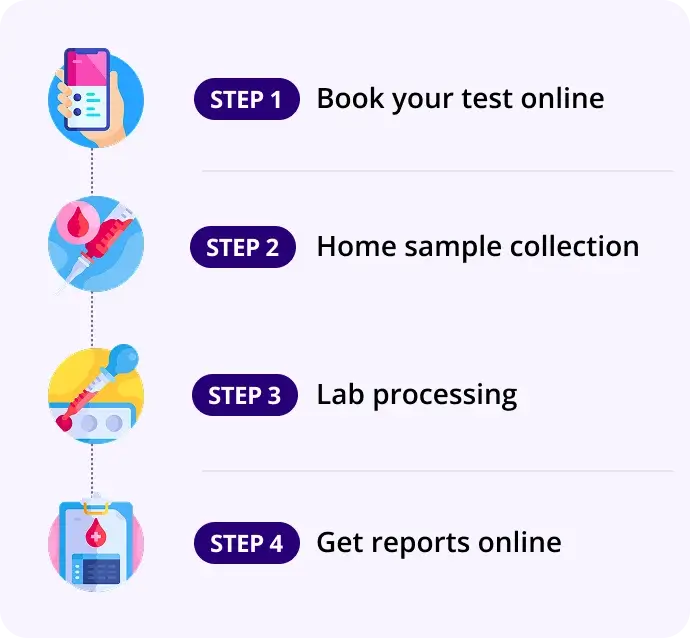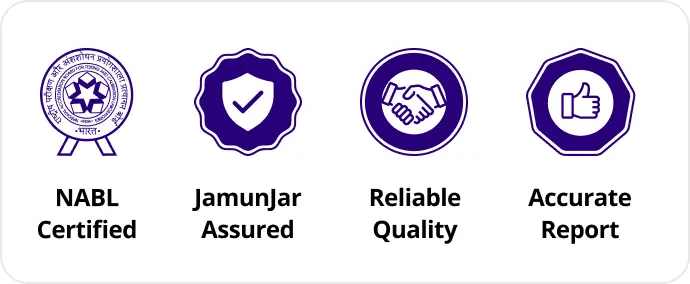Search for
Ceruloplasmin
Liver
Report in 4Hrs
At Home
No Fasting Required
Details
Used in diagnosis of Wilson’s disease; reflects copper-binding capacity in liver disorders.
₹499₹1,350
63% OFF
FREE:
Ai Insights
Ceruloplasmin Test Information Guide
- Why is it done?
- Test Purpose: Ceruloplasmin measures the level of a copper-carrying protein synthesized by the liver. This test detects abnormalities in copper metabolism and helps diagnose Wilson's disease and other copper-related disorders.
- Primary Indications: Suspected Wilson's disease (genetic copper metabolism disorder); Unexplained neurological or psychiatric symptoms; Cirrhosis or chronic liver disease of unknown cause; Family history of Wilson's disease; Copper toxicity evaluation; Screening for genetic copper transport disorders.
- Typical Timing: Ordered when patients present with movement disorders, cognitive decline, liver dysfunction, or psychiatric changes; Often part of initial diagnostic workup for unexplained hepatic or neuropsychiatric symptoms; Used for monitoring patients on chelation therapy for Wilson's disease.
- Normal Range
- Reference Values: 20-40 mg/dL (200-400 mg/L) for adults; 23-43 mg/dL is typical reference range; May vary slightly between laboratory facilities depending on testing methods.
- Units of Measurement: mg/dL (milligrams per deciliter) or mg/L (milligrams per liter)
- Normal Result Interpretation: Normal ceruloplasmin levels indicate appropriate copper metabolism and normal hepatic function; Suggests Wilson's disease is unlikely, though not entirely excluded; Normal results reduce suspicion for copper-related metabolic disorders.
- Low Results (<20 mg/dL): Highly suggestive of Wilson's disease; Associated with copper accumulation in tissues; Requires immediate further evaluation and confirmatory testing.
- High Results (>50 mg/dL): May indicate acute phase response or inflammation; Can be elevated in pregnancy, estrogen use, or acute liver disease; Generally less clinically significant than low values.
- Interpretation
- Low Ceruloplasmin (<20 mg/dL): Classic marker for Wilson's disease; Indicates copper cannot be properly bound and transported; Free copper accumulates in liver, brain (particularly basal ganglia), cornea, and other organs; When combined with low serum copper and elevated urinary copper, confirms diagnosis; Neurological manifestations may develop or progress.
- Normal Range Ceruloplasmin in Suspected Wilson's Disease: Does not exclude Wilson's disease; Approximately 5-10% of patients have normal ceruloplasmin levels; Requires additional testing: slit-lamp examination for Kayser-Fleischer rings, 24-hour urinary copper, serum copper levels, genetic testing.
- Elevated Ceruloplasmin (>50 mg/dL): Usually excludes Wilson's disease diagnosis; May reflect acute inflammatory response, infection, or stress; Common in pregnancy and oral contraceptive use; Elevated in acute hepatitis or cholestasis; May be seen with malignancy.
- Borderline Values (15-25 mg/dL): Requires careful clinical interpretation; Additional testing essential; Must correlate with clinical symptoms and other laboratory findings; Consider serological and genetic confirmation.
- Factors Affecting Results: Estrogen use and pregnancy elevate levels; Acute inflammation and infection increase values; Liver disease severity affects production; Age may influence reference ranges; Timing relative to meals or recent copper intake; Presence of other hepatic conditions.
- Clinical Significance: Most valuable when low and combined with clinical presentation; Single best screening test for Wilson's disease; Used for disease monitoring during treatment; Helps differentiate Wilson's disease from other causes of cirrhosis; Prognostic indicator for neurological involvement; Treatment response assessment parameter.
- Associated Organs
- Primary Organ System: Liver (hepatic system) - site of ceruloplasmin synthesis; Central nervous system - copper accumulation in basal ganglia and brainstem causes neurological symptoms; Cornea - where Kayser-Fleischer rings (copper deposition) develop.
- Diseases Detected or Monitored: Wilson's disease (primary indication); Menkes disease (X-linked copper deficiency); Ceruloplasmin deficiency (rare); Chronic liver disease with copper accumulation; Hepatitis with copper dysfunction; Cirrhosis of unknown etiology; Neuropsychiatric disorders secondary to copper toxicity.
- Potential Complications of Abnormal Results: Wilson's disease: Progressive neurological deterioration with movement disorders (tremor, dystonia, parkinsonism), cognitive decline, psychiatric changes (depression, psychosis, personality changes); Hepatic complications including cirrhosis, liver failure, acute hepatitis; Hemolytic anemia from copper toxicity; Renal tubular dysfunction; Ophthalmologic complications beyond Kayser-Fleischer rings.
- Organ-Specific Risks: Brain: Irreversible neurological damage if untreated; Basal ganglia degeneration; Brainstem involvement; Cerebellar ataxia; Liver: Progressive fibrosis to cirrhosis; End-stage liver disease; Liver transplantation requirement; Kidney: Tubular reabsorption defects; Renal dysfunction; Bones: Osteoporosis risk with some treatments.
- Follow-up Tests
- Confirmatory Testing for Low Ceruloplasmin: 24-hour urinary copper (>100 mcg/24 hours suggests Wilson's disease); Serum copper levels (usually low in Wilson's disease); Non-ceruloplasmin-bound copper ("free copper") calculation; Slit-lamp examination for Kayser-Fleischer rings; Genetic testing for ATP7B gene mutations; Liver function tests (AST, ALT, bilirubin, albumin).
- Additional Diagnostic Tests: Brain MRI to assess for basal ganglia involvement and neurological changes; Liver ultrasound or CT for cirrhosis evaluation; Complete blood count to detect hemolytic anemia; Coagulation studies if liver disease present; Ceruloplasmin oxidase activity testing (functional assessment); Liver biopsy in select cases with hepatic copper quantification.
- Monitoring During Treatment: Repeat ceruloplasmin testing every 6-12 months; 24-hour urinary copper monitoring (target <75 mcg/24 hours on therapy); Serum copper levels during chelation therapy; Liver function tests every 6 months; Neurological assessment at each visit; Medication adherence evaluation; Slit-lamp examination annually for Kayser-Fleischer ring regression.
- Related Complementary Tests: Transferrin saturation (in iron overload differentiation); Ferritin levels (if concurrent iron metabolism concerns); Albumin and prealbumin (hepatic synthetic function); Ammonia levels (if encephalopathy suspected); Prothrombin time/INR (hepatic function); Alpha-fetoprotein (hepatocellular carcinoma screening in advanced disease).
- Screening Recommendations: Family members of Wilson's disease patients should be screened (ceruloplasmin, copper studies, genetic testing); Asymptomatic relatives identified early have better treatment outcomes; Screening typically done in childhood/adolescence in at-risk families; Consider repeat testing in borderline cases after 4-6 weeks.
- Fasting Required?
- Fasting Requirement: NO fasting is required for the ceruloplasmin test
- Blood Draw Timing: Can be performed at any time of day; Food and fluid intake do not affect ceruloplasmin levels; Patient may eat and drink normally before the test; No dietary restrictions necessary.
- Medication Considerations: Continue all regular medications unless otherwise directed by physician; Estrogen-containing medications should be noted (may elevate results); Patients on chelation therapy for Wilson's disease should continue medications; Inform laboratory of relevant medications affecting copper metabolism; No medication timing adjustment needed specifically for this test.
- Other Preparation Requirements: Arrive well-hydrated (helps with blood draw); Wear loose, comfortable clothing with accessible arms; Inform phlebotomist of any bleeding disorders or medications affecting clotting; No special skin preparation needed; Minimal stress before test (stress can alter acute phase proteins); Report any acute illness or fever to the laboratory; In Wilson's disease patients, consistent timing of draws helps track treatment response.
- Special Instructions: If copper studies or 24-hour urinary copper collection is also ordered, follow specific instructions for those tests; For simultaneous ceruloplasmin and copper level testing, use appropriate collection tubes (usually serum separator tube); Notify laboratory if patient has had recent transfusions; For monitoring therapy, try to schedule tests at consistent times; Pregnancy should be reported as it elevates ceruloplasmin levels.
How our test process works!

